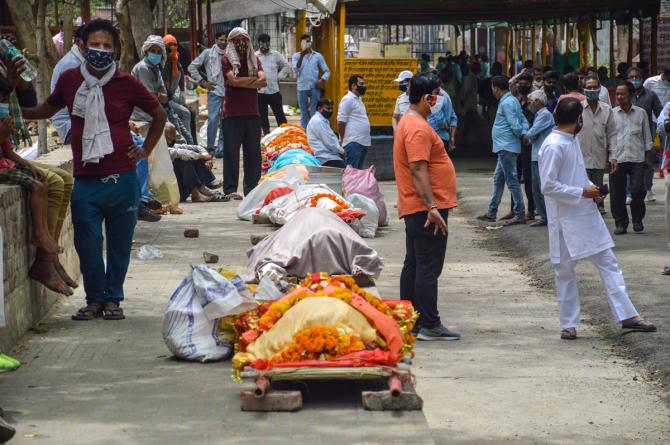Based on whether you choose the aviation, Bhopal or LIC numbers, and on the official death toll (in the absence of any other verifiable number), the value of human lives lost in the pandemic would range from Rs 16,500 crore to Rs 94,000 crore, explains T N Ninan.
Caution: Graphic content. Viewer discretion is advised.

About 10 million people die in India in a normal year.
In the past 14 abnormal months, the official Covid toll has reached 396,730 lives.
Most commentators think that is an underestimate, with the real figure said to be twice to five times as large.
If we assume a multiple of three, well over a million may have died of Covid - or a tenth of the usual annual total.
In the peak months, Covid is estimated to have been the second-largest cause of death in the country.
Such a significant mortality event has to be in a separate category from the usual roll-call of deaths -- similar to but obviously not the same as deaths from an air crash or an industrial disaster like the Bhopal gas tragedy of 1984.
But unlike with 9/11 or even the running history of railway accidents, no country is paying compensation to the families of Covid victims.
This must be on the assumption that, unlike industrial accidents, pandemic deaths are not in anyone's control.
But the argument does not hold.
The widely differing death tolls in different countries reflect the varying levels of competence with which governments have tackled the pandemic.
Many of the deaths were eminently preventable.
So, just as governments have chosen to compensate those rendered jobless or plain destitute, they should take responsibility for compensating the families of Covid victims.
What would that mean financially? It depends on whether human life is considered cheap or valuable.
When an Air India Express aircraft crashed last year, the airline offered an interim award of Rs 10 lakh (Rs 1 million) to the next of kin of those who had died.
Against this, the Montreal Convention, which guides such matters, values a life lost in an air crash at about Rs 1.2 crore (Rs 12 million).
Another figure on the value of a life comes from the Bhopal tragedy.
The average compensation paid to the families of 15,300 people who died would in today's terms be Rs 460,000.
Consider also how the Life Insurance Corporation assesses what it calls human life value.
Someone aged 50, earning Rs 30,000 per month, would have his or her life valued at about Rs 26 lakh (Rs 2.6 million).
So what is the monetary loss to the families of those who have died from Covid?
Based on whether you choose the aviation, Bhopal or LIC numbers, and on the official death toll (in the absence of any other verifiable number), the value of human lives lost would range from Rs 16,500 crore (Rs 165 billion) to Rs 94,000 crore (Rs 940 billion).
The upper bound would be less than 0.50 per cent of last year's GDP, whereas the US provided 0.66 per cent of GDP as compensation for the victims of the 9/11 attack in 2001 (some 2,800 died while many more were injured).
In other words, the sums are affordable.
These numbers relate to the loss borne directly on account of Covid fatalities.
The total economic cost is, of course, very much greater (including to those who have survived but lost jobs, for instance).
These two numbers, on lives lost and economic cost, seem to move in tandem.
Countries with more deaths have also seen their economies suffer more (Britain and Brazil are good examples).
Paying compensation to victims removes the illusion of choice, of having more of one and less of the other.
Collateral benefits follow. The prospect of compensation will incentivise families of victims to report deaths properly, so we get more accurate death statistics.
In turn, that acts as pressure from below, forcing governments to bring the situation under control.
And finally, Covid should sharpen the focus on the larger issue of preventable deaths -- rail and road accidents, infant mortality, and so on.
How much money should be spent on reducing such deaths that are all too many in India?
If the additional cost of saving each untimely death were less than the economic value of a human life, irrespective of whether compensation is paid or not, it would be money well spent from the individual's point of view, and in the larger societal interest.












